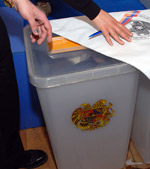After the parliamentary elections, the comparative peace in the political field can be explained as an expectation or positioning before the “big trade.” We of course mean the 2013 presidential elections. If before February of the next year no unexpected or sudden developments take place in Armenia or around Armenia and the political parties step in the election process with the current positioning then the process of elections can be more or less predicted. Even in the case when “unprecedented alliances” or “pre-election coalitions” are formed the incumbent president Serzh Sargsyan will most probably continue his tenure after the 2013 elections. On the one hand, by considering the “model” elections of May 6 and on the other hand the positioning of the political parties we can claim that he’s going to win. Even now there are predictions that the ANC leader Levon Ter-Petrosyan may not run in the 2013 race, however, even if he decides to do so he can no more be a winning candidate as in 2008 elections. And if Ter-Petrosyan is not nominated then the victory of any other ANC member in the case of his nomination will become pointless. The same can be said about the other wing of the opposition – the Heritage and Republic parties and their potential allies, even if they decide to nominate a joint candidate in the person of Raffi Hovhannisian. We can claim the same if these parties decide to nominate a different candidate. The problem is not that the mentioned candidates with their qualities are worse than Serzh Sargsyan. After the last parliamentary elections the demonstrated behavior of the political parties at least now does not inspire the society the hope of consolidation. And most importantly, all the political parties that gained seats in the parliament have formally accepted all the methods that have been used during the parliamentary elections, which will also be surely applied in the upcoming presidential race. Indeed, one of the intrigues of presidential elections is the possible participation of Robert Kocharyan either personally or by endorsing a candidate. And the PAP approach will depend on that. But this will hardly have any essential influence on the election outcome. Even if Robert Kocharyan personally runs, this can’t have the same effect of “return” as Ter-Petrosyan had in 2008. In the event if a different candidate runs from the PAP, ARF or even ANC they will have a goal to receive a bigger piece of the apple pie in the government, which can be expressed by Robert Kocharyan’s appointment as Prime Minister. And the behavior of the PAP after the May 6 elections shows that this party cannot go beyond the limits of “strict constructiveness” during the presidential elections. It means that in the current conditions all the parties that we’ll be possibly running in the presidential race will have in mind the victory of Serzh Sargsyan. Indeed, it’s going to depend on the behavior and attitude of these parties to what extent the elections will be held smoothly and fairly and how strong or weak the future power of Serzh Sargsyan will be. And this will become the main locomotive of the next elections. It means that all the parties – governmental or oppositional, will be trying to trade and cut deals during the presidential elections.

